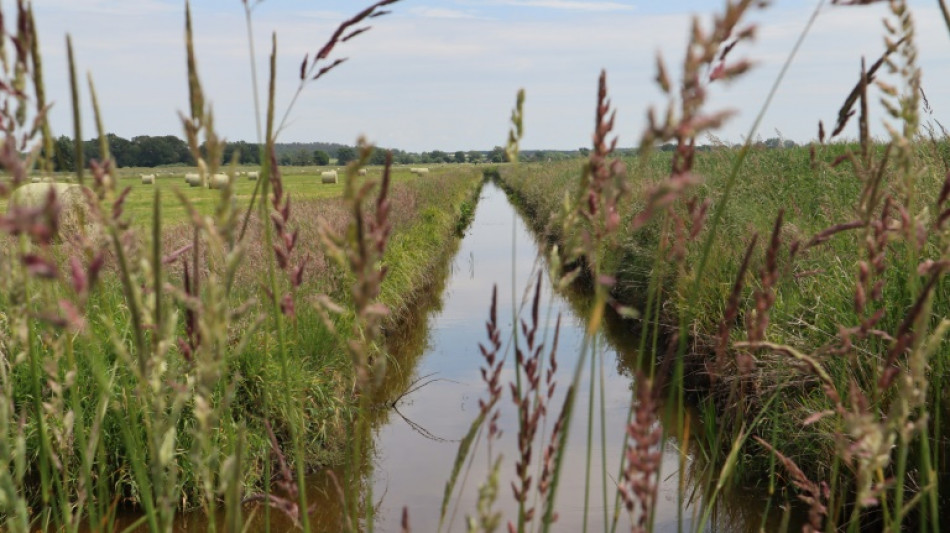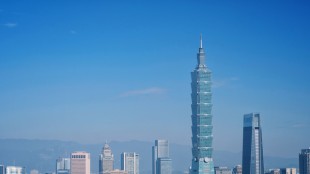
-
 'Girl with a Pearl Earring' to be shown in Japan, in rare trip abroad
'Girl with a Pearl Earring' to be shown in Japan, in rare trip abroad
-
Syria tells civilians to leave Aleppo's Kurdish areas

-
 'Sign of life': defence boom lifts German factory orders
'Sign of life': defence boom lifts German factory orders
-
Japan's Fast Retailing raises profit forecast after China growth

-
 Olympic champion Zheng out of Australian Open
Olympic champion Zheng out of Australian Open
-
England's Brook 'deeply sorry' for nightclub fracas

-
 New clashes in Iran as opposition urges more protests
New clashes in Iran as opposition urges more protests
-
Equity markets mostly down as traders eye US jobs data

-
 England cricket board launches immediate review into Ashes debacle
England cricket board launches immediate review into Ashes debacle
-
Dancing isn't enough: industry pushes for practical robots

-
 Asian markets mostly down as traders eye US jobs data
Asian markets mostly down as traders eye US jobs data
-
Australia to hold royal commission inquiry into Bondi Beach shooting

-
 Sabalenka accuses tour chiefs over 'insane' tennis schedule
Sabalenka accuses tour chiefs over 'insane' tennis schedule
-
Cambodia to liquidate bank founded by accused scam boss

-
 Farmers enter Paris on tractors in protest at trade deal
Farmers enter Paris on tractors in protest at trade deal
-
Viral 'Chinese Trump' wins laughs on both sides of Pacific

-
 Stokes vows to stay on but 'wrongs to put right' after crushing Ashes defeat
Stokes vows to stay on but 'wrongs to put right' after crushing Ashes defeat
-
Lidl to drop broadcast TV ads in France

-
 Stokes admits 'wrongs to put right' after crushing Ashes defeat
Stokes admits 'wrongs to put right' after crushing Ashes defeat
-
Sabalenka impresses again in Australian Open warm-up, vows more to come

-
 Gilgeous-Alexander to the rescue as Thunder sink Jazz in overtime
Gilgeous-Alexander to the rescue as Thunder sink Jazz in overtime
-
From Diaz to 'Mazadona' - five new faces starring at AFCON

-
 Startups go public in litmus test for Chinese AI
Startups go public in litmus test for Chinese AI
-
Death of Bazball: Five things we learned from Ashes series

-
 Australia's emotional Khawaja bows out for final time with Ashes win
Australia's emotional Khawaja bows out for final time with Ashes win
-
Asian markets mixed as traders eye US jobs data

-
 Australia win final Test to complete 4-1 Ashes triumph over England
Australia win final Test to complete 4-1 Ashes triumph over England
-
Trump withdraws US from key climate treaty, deepening global pullback

-
 Trump pulls US out of key climate treaty, deepening global pullback
Trump pulls US out of key climate treaty, deepening global pullback
-
Morocco under huge pressure as hosts face Cup of Nations heat

-
 Australia heatwave stokes risk of catastrophic bushfires
Australia heatwave stokes risk of catastrophic bushfires
-
Australia 71-2 at lunch, need 89 more to win final Ashes Test

-
 Study shows how fast kilos return after ending weight-loss drugs
Study shows how fast kilos return after ending weight-loss drugs
-
Trump pulls US out of key climate treaty, science body: White House

-
 England all out for 342, set Australia 160 to win final Ashes Test
England all out for 342, set Australia 160 to win final Ashes Test
-
FDA Clears Toetal Solution's Ziptoe Hammertoe System

-
 AbTherx and Red Queen Bio Partner on Therapeutic Antibody Discovery
AbTherx and Red Queen Bio Partner on Therapeutic Antibody Discovery
-
Banyan Gold Intersects Multiple High-Grade Mineralization Occurrences in Powerline and Airstrip Deposits, AurMac, Yukon, Canada

-
 Best Platform to Buy Crypto 2026 Announced
Best Platform to Buy Crypto 2026 Announced
-
New Digital Platform Fast Food Menu info Launches to Simplify Fast-Food Menu and Pricing Decisions

-
 Guam W2 Electronic Filing and EFW2 Generator for GuamTax.com W-2GU Wage Data Upload Announced by Real Business Solutions
Guam W2 Electronic Filing and EFW2 Generator for GuamTax.com W-2GU Wage Data Upload Announced by Real Business Solutions
-
Silver Range Provides an Operational Update

-
 Zenwork Joins the National Association of Computerized Tax Processors (NACTP)
Zenwork Joins the National Association of Computerized Tax Processors (NACTP)
-
Kee Ming Group Berhad Inks Underwriting Agreement With TA Securities Ahead Of ACE Market IPO

-
 Market Logic Announces Technology Partnership with Zappi to Accelerate Innovation with AI
Market Logic Announces Technology Partnership with Zappi to Accelerate Innovation with AI
-
Just - Evotec Biologics Receives Grant for AI-Driven Optimization of Monoclonal Antibody Developability for Affordable Access

-
 Lighthouse Names Georg Beyschlag Chief Financial Officer as Company Scales for Next Phase of Global Growth
Lighthouse Names Georg Beyschlag Chief Financial Officer as Company Scales for Next Phase of Global Growth
-
Storm in a tea cup for Frank as pressure mounts on Spurs boss

-
 Sesko spark masks Man Utd disappointment for Fletcher
Sesko spark masks Man Utd disappointment for Fletcher
-
Venezuelan opposition blindsided by Trump, waiting it out


Rewetting German marshes to blunt climate change impact
Amid the fields of northern Germany a vast expanse of bulrushes has been planted to form one of Europe's largest reclaimed marshes.
Just four years ago, the 10-hectare (25-acre) plot close to the town of Malchin was a simple field.
Like 98 percent of Germany's historic wetlands, the area slowly dried up over centuries as its peat was harvested and the soil cultivated for grain or keeping livestock.
Now, the land has been rewetted and planted with rushes that rise up to two metres (seven feet) high.
With rubber boots that go up to her knees and a GPS navigation device in hand, biologist Meline Brendel wades through the marshes' stagnant waters.
"Marshes cover three percent of the Earth's surface and trap twice as much CO2 as all forests," says Brendel.
Left alone, such bogs are massive sinks for carbon locked into the peat and prevented from escaping as gas by the water that covers the ground.
Once dry, however, the earth releases the stored carbon when it comes into contact with oxygen.
"In this region, marshes therefore emit more CO2 than all forms of transport put together," says the scientist.
Over a year, one hectare of drained marshland produces as much CO2 as a car travelling 145,000 kilometres (90,000 miles), according to the Greifswald Mire Centre.
- Wetland habitat -
In Germany, current and former wetlands cover some five percent of the country's land area -- although the overwhelming majority has been drained.
To keep these emissions in check, the government-financed Paludi-PROGRESS project funded the rewetting of the former marshland.
The land was criss-crossed with trenches, flooded and planted with bulrushes.
Today, the area is habitat to a multitude of birds, fish, insects, spiders and amphibians. The bulrushes are cut each year and used for household insulation, among other practical applications.
Her eyes glued to the GPS, Brendel navigates her way through the wet maze, sinking a spike into the peat as she goes to measure the level of the water.
"The problem is that projects like ours are still just pilots. The plants cannot yet be used on an industrial scale" as material for roofing or insulation, she says.
The German government, which aims to make Europe's top economy carbon neutral by 2045, last year launched a four-billion-euro ($4.5 billion), four-year plan of action to "improve the general state of ecosystems" in the country.
Half of the programme's funds will go toward protecting marshes.
A new law encouraging such efforts within the EU was recently adopted by the European Parliament. However, the programmes have run into opposition from farmers.
- Cows and carbon -
For Brendel, the point is not to "force the rewetting of fields on farmers", but to convince them of its importance for the climate and the possibility to make a living from cultivating wetland.
The 28-year-old scientist concedes that farming marshes is currently "not recognised as agriculture and farmers therefore don't have access to organic farming subsidies".
"We need to make it more accessible and less bureaucratic to turn drained land back into marshes and to share what we have learned."
Twenty years ago, Bavarian farmer Lorenz Kratzer opted for an intermediate solution: keeping livestock on marshland that is slightly less wet than normal and giving his animals plenty of land to roam.
On a hot summer's day in Freising in southern Germany, 20 or so of his cows seek the shade of the trees and bushes growing on his marshland used for grazing.
As the soil dries out due to climate change, the 64-year-old says it "would be a very good thing... to let the marshes return to nature, to flood them again".
"The creation of pastures goes along well with this. You can see that the grass is growing better," he said.
Kratzer sells his organic meat locally, showing that it's possible to combine agriculture and marshland protection.
Back in Malchin, across the way from the reclaimed marsh, a herd of cows grazes peacefully in a field.
"You can't see it but carbon is escaping from the ground" dried to make pastures for livestock, says Brendel, who dreams of a world where "there are no more dry marshes".
X.Karnes--AMWN

